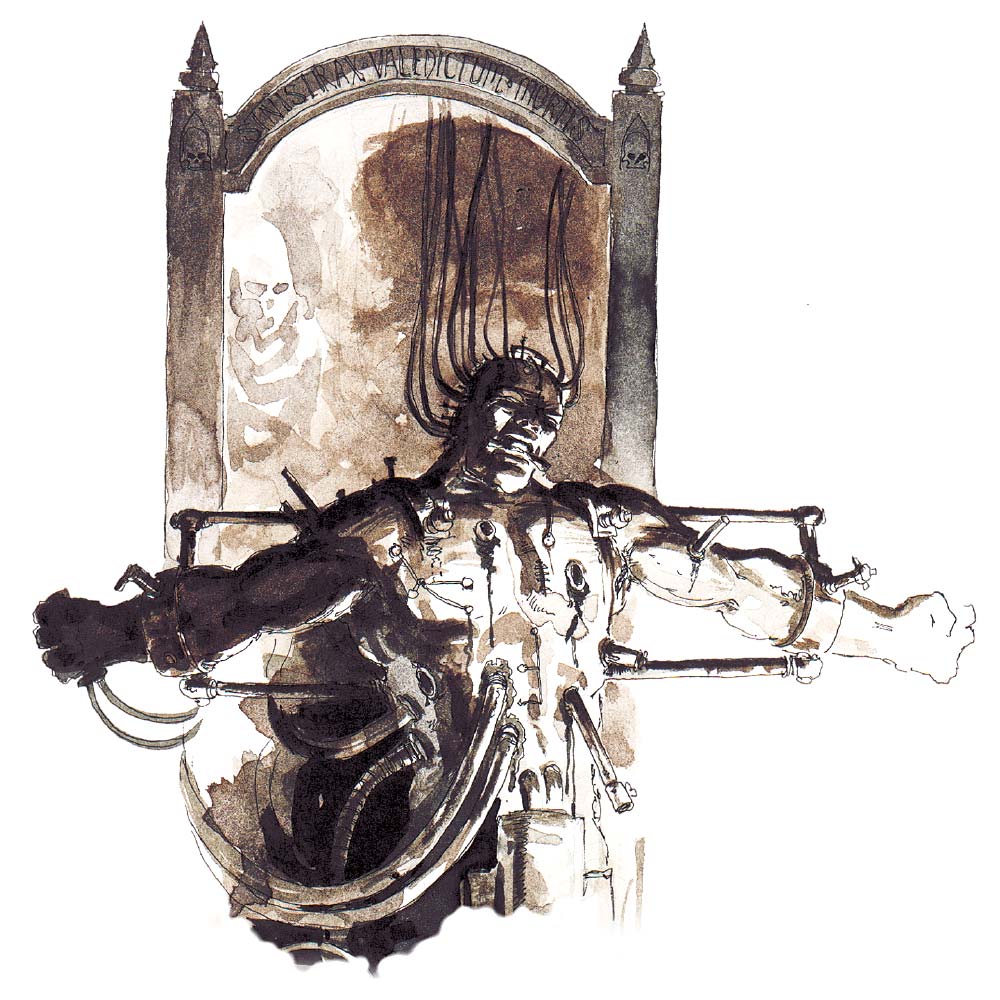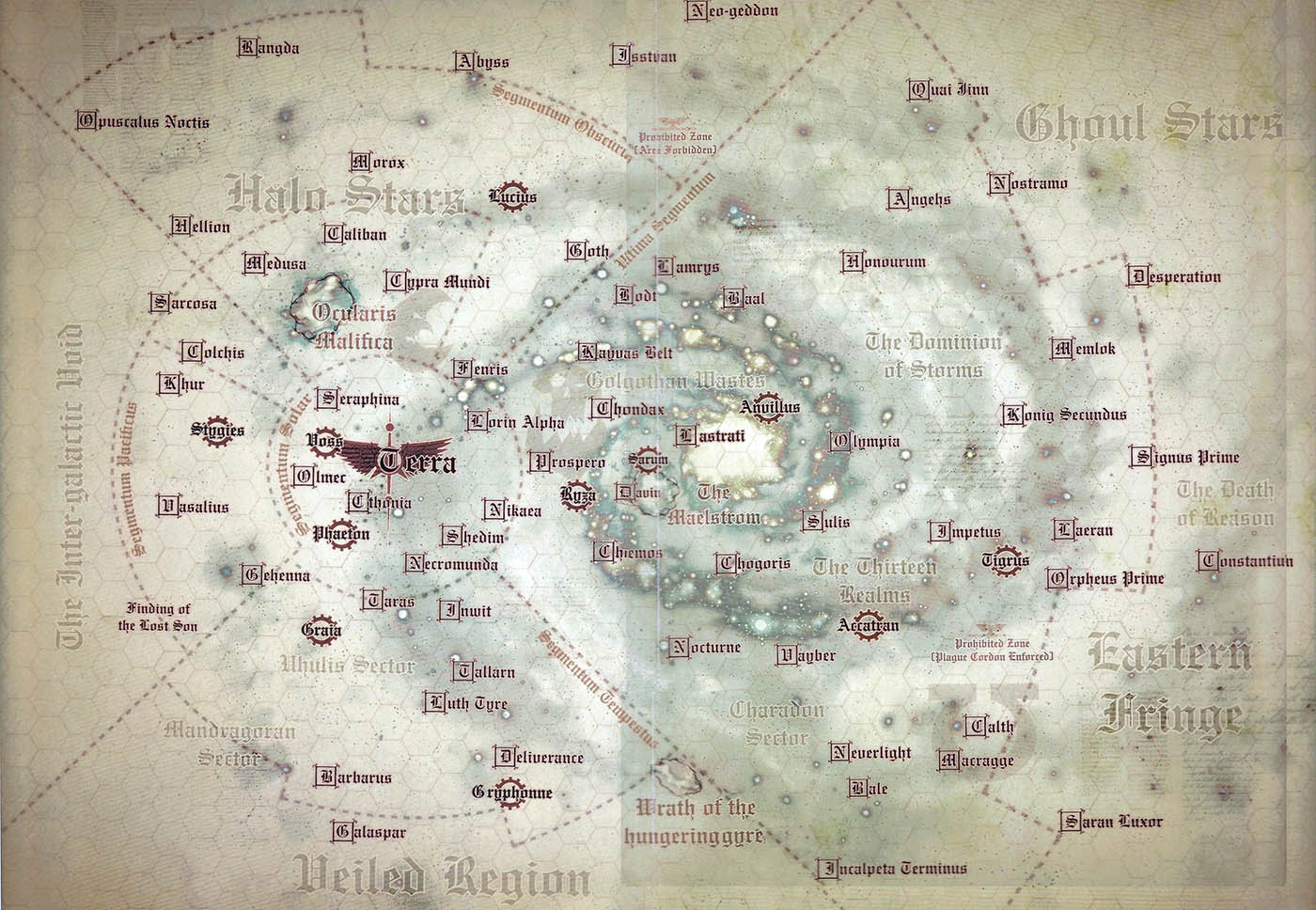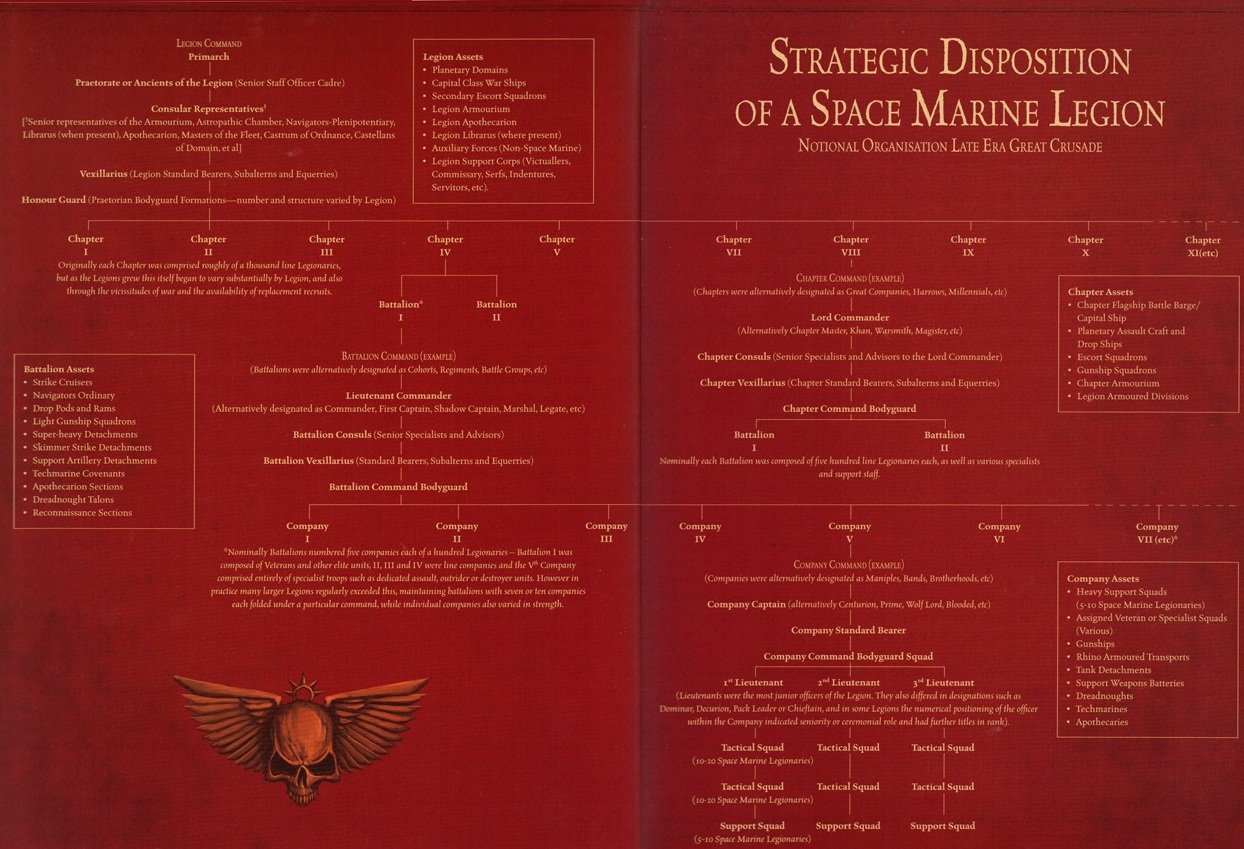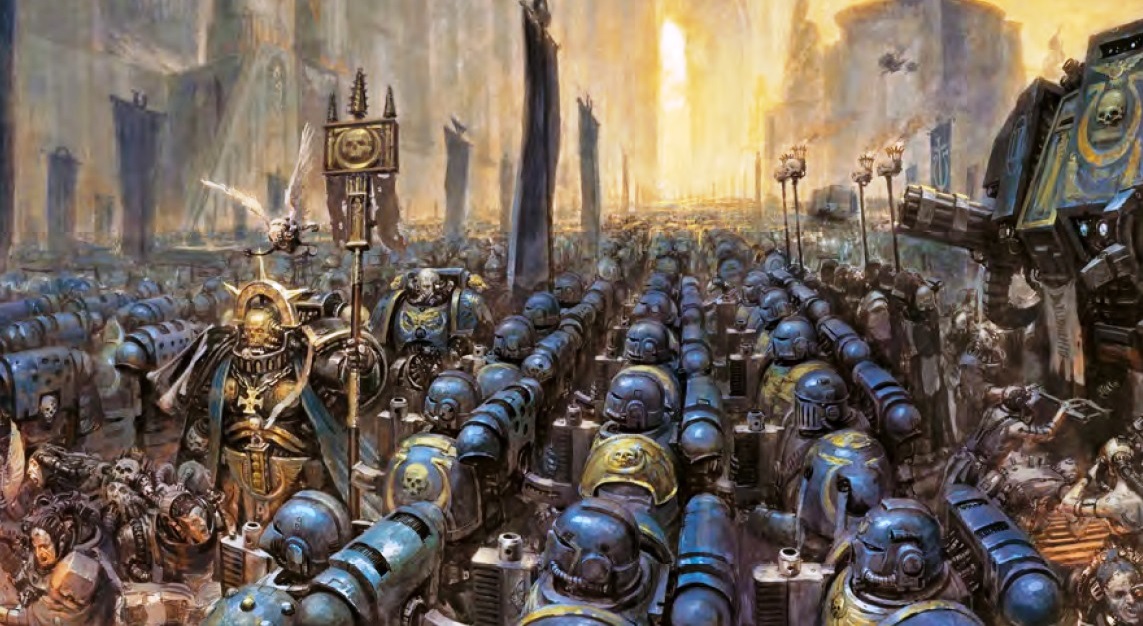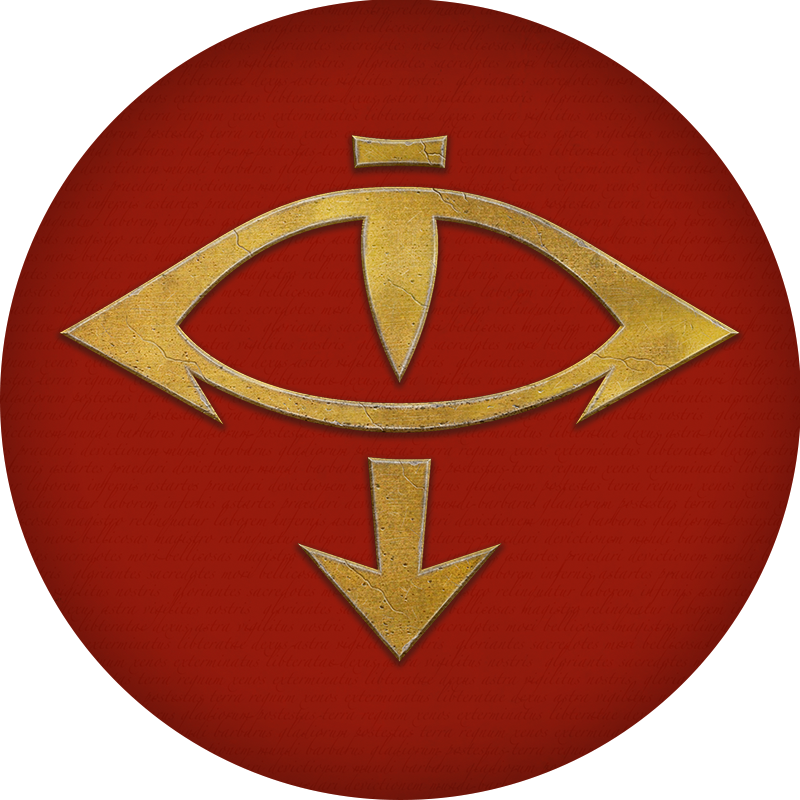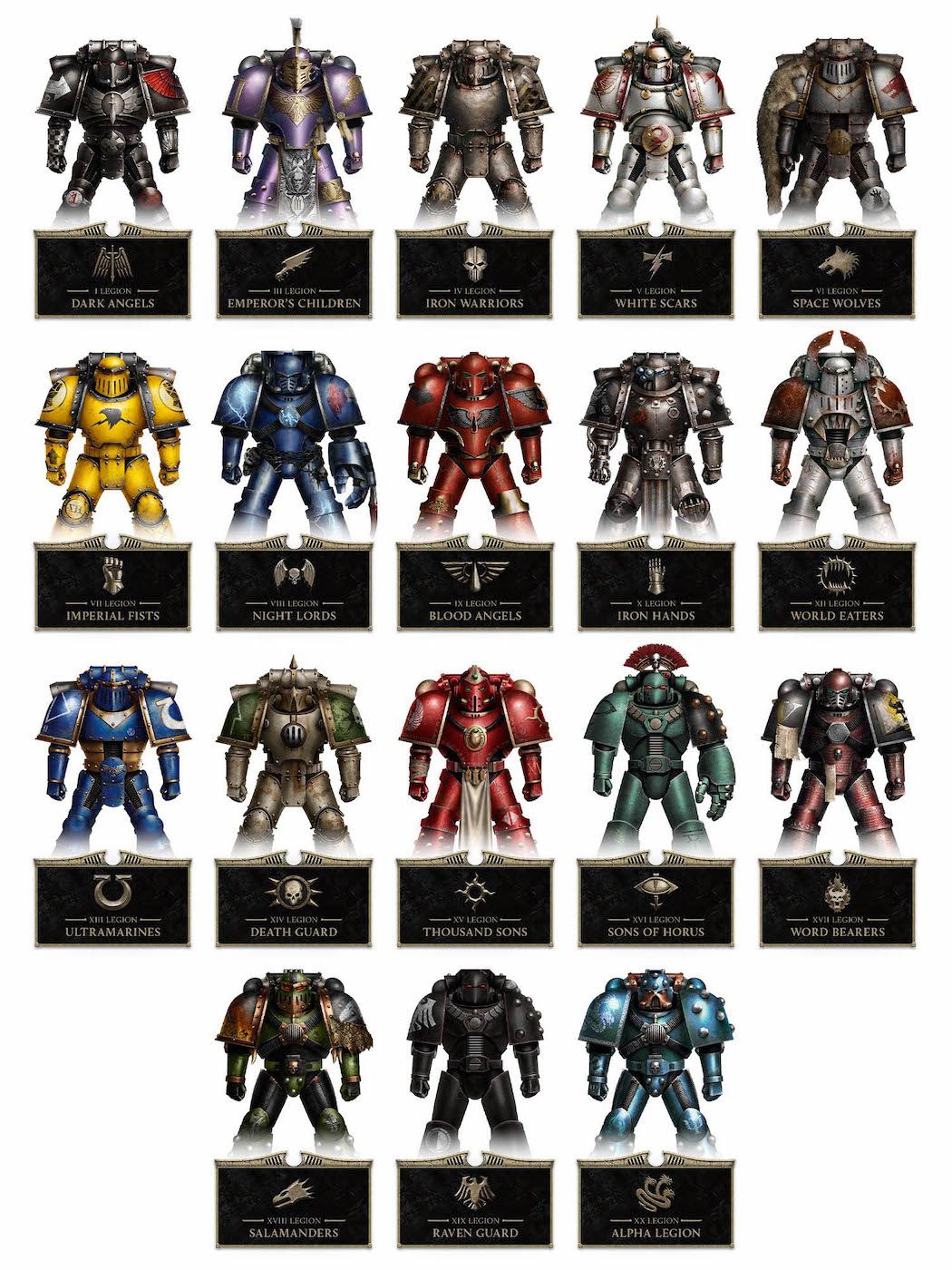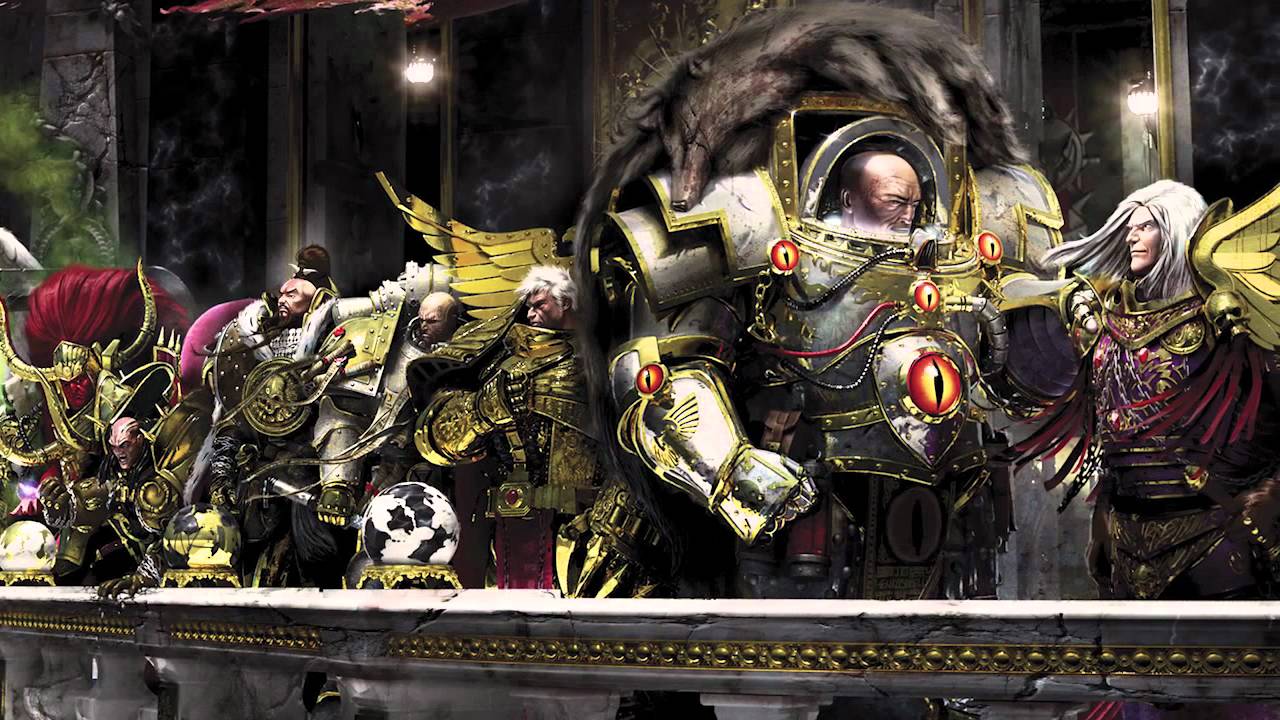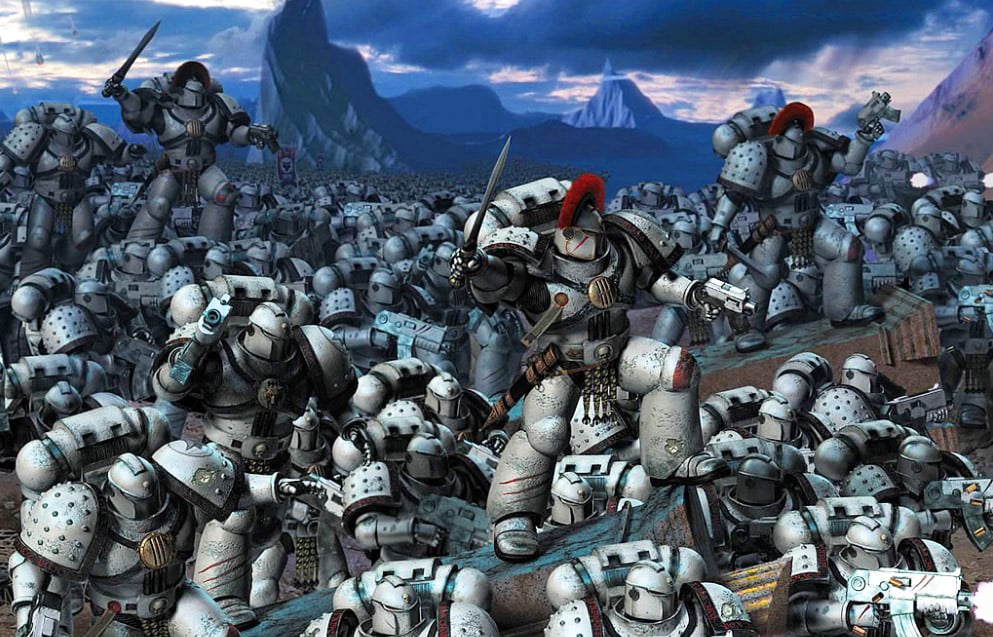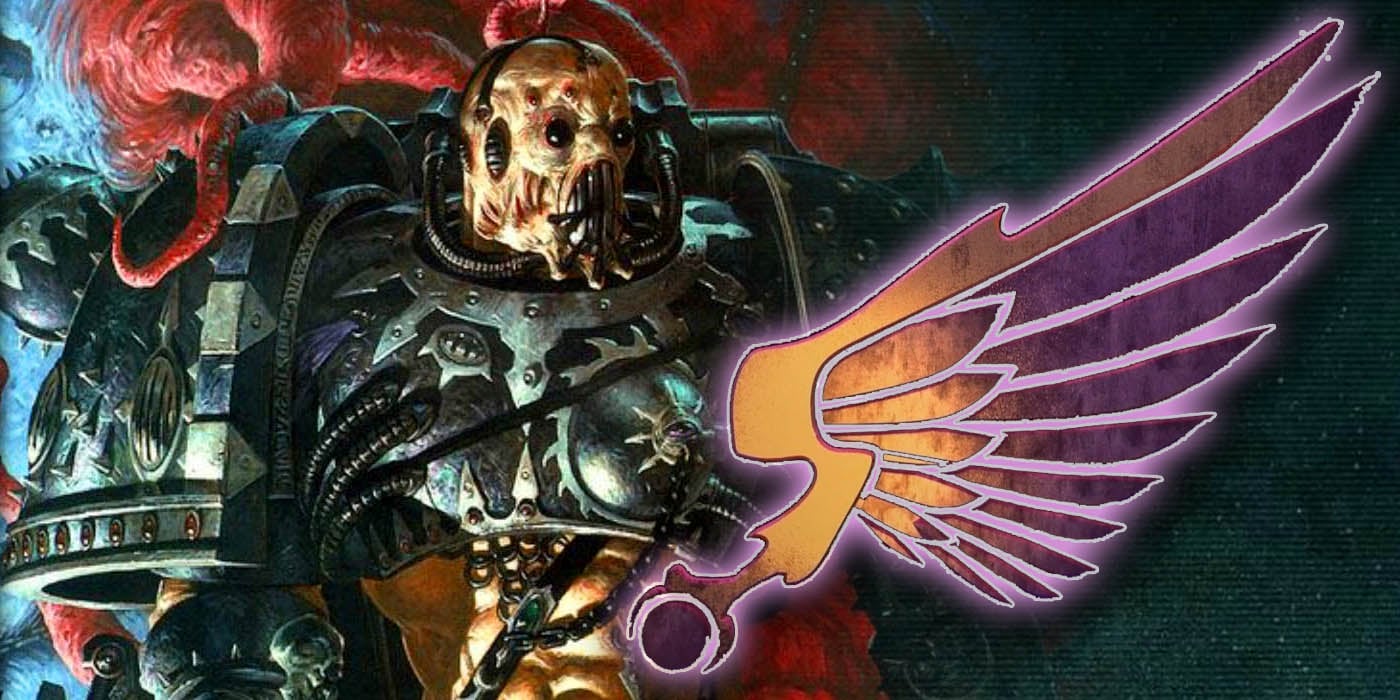Warhammer 40K: The 20 Space Marine Legions
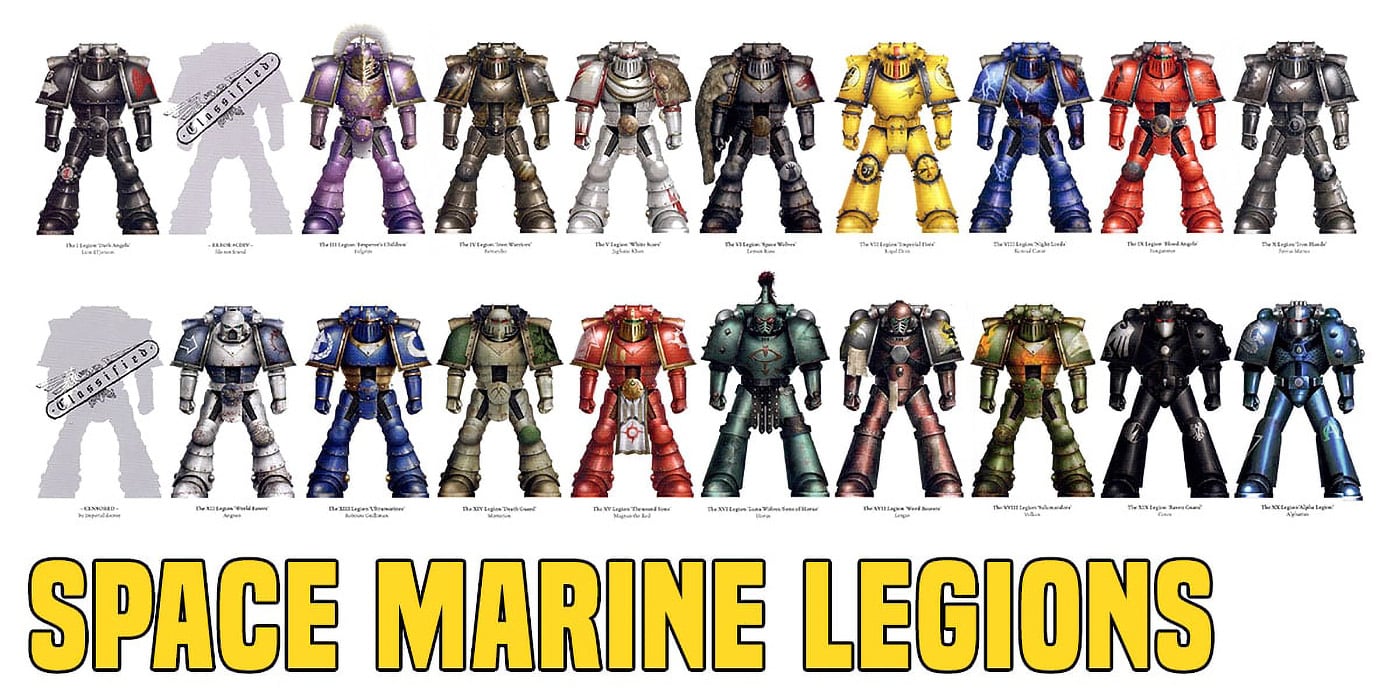

Long before they were chapters – the Astartes conquered the galaxy with twenty great Space Marine Legions. Here is what is known of them:
The twenty Space Marine Legions, also known as the Legiones Astartes, were created by the Emperor to take part in the Great Crusade in what was later known as the First Founding. All the Space Marines of a Legion (“battle-brothers” amongst themselves) were modified with help of the DNA samples of a single Primarch. As a Primarch was found, he would receive the command of his respective Legion.
Early Space Marine Legion History
The Legiones Astartes were originally created by the Emperor and his gene-wrights in the closing days of the Unification Wars and the extinction of their predecessors, the Thunder Warriors. The new Astartes had superior lifespans and discipline to the Thunder Warriors and were intended by the Emperor to spearhead his coming Great Crusade. Each of the twenty Legions was created from gene-seed derived from a single Primarch, which were themselves maturing deep under the Himalayan Mountains before they were stolen away from the Forces of Chaos. However while Gene-Seed was created by the Emperor, it was perfected and mass-produced by the Gene-Cults of Luna after they were pacified by the early Astartes.
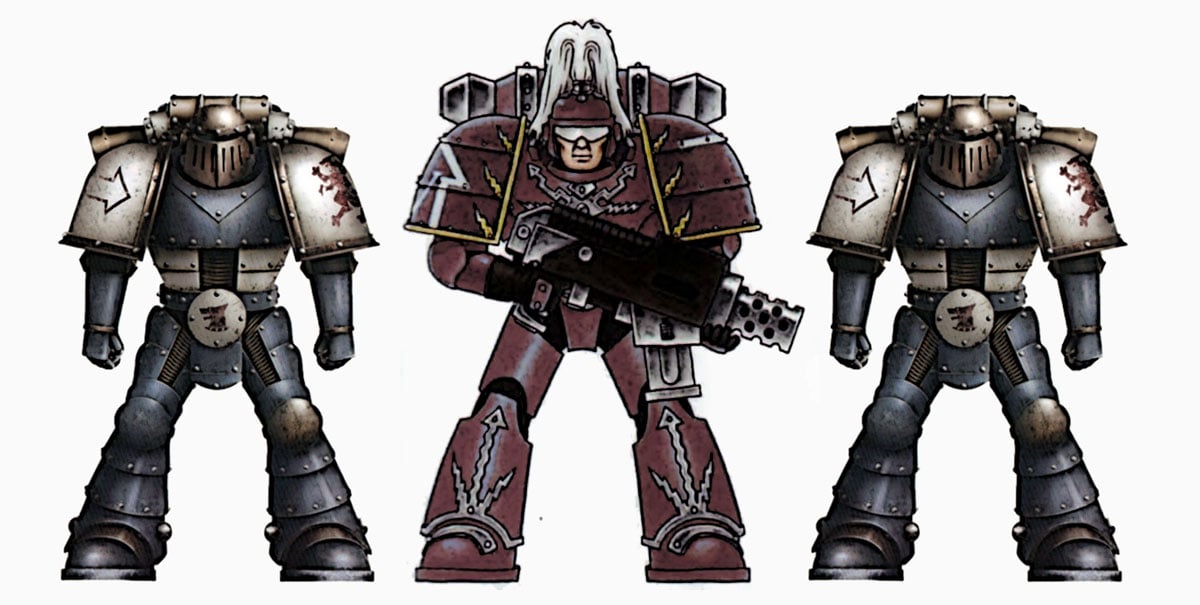 Thunder Warrior flanked by later Astartes Legionaries
Thunder Warrior flanked by later Astartes Legionaries
During the subsequent Great Crusade, the twenty Legiones Astartes were the tip of the Emperor’s spear in his conquest of much of the galaxy. Gradually, the twenty lost Primarchs were reunified with their respective Legion and led them to further glories, where they would begin to establish unique identities for themselves. However, at some point during the Great Crusade, two of the legions were erased from all records for unknown reasons.
In the Horus Heresy, nine of the eighteen remaining Legions sided with Warmaster Horus against the Emperor. After the Battle of Terra, these fled into the Eye of Terror where many fragmented into disparate warbands that continue to plague the Imperium to this day. The remaining loyalist Legions were broken up by Roboute Guilliman as per the new Codex Astartes. The Space Marine Legions effectively ceased to exist after this act, succeeded by hundreds of new Chapters.
Space Marine Legion Structure
The Legio Astartes, being far larger than current Space Marine Chapters, were organized along drastically different lines. At the head of the Legion was its Primarch Commander who oversaw the Legion’s headquarters. Below this was the Chapters of the Legion, each of which was commanded by a Chapter Commander. Each Chapter, in turn, was divided into a number of Battalions, each of which was further divided into Companies. The Company, itself divided into a number of Squads, was the basic military division of the Legio Astartes. Due to the varying sizes of each Legion, there was no fixed number of how many Chapters, Battalions, Companies, and Squads a Legion would contain.
Number of Space Marine Legionaries
The Legions were massive armies, and the size of each could vary tremendously. A precise number was never truly achieved and maintained. Even during the Great Crusade, some Legions were very numerous, while others were not. The numbers would always vary with new recruits and inevitable battle-losses, and also important was the availability of potential recruits and the administrative skills of the Primarch and his officers.
The most numerous Legion of all was the Ultramarines. The Thousand Sons of Magnus were of a small number as many of them had developed mutations or uncontrollable levels of psychic powers. Fulgrim’s samples had been largely lost, and this left the Legion of the Emperor’s Children also with a very small number. Both of these Legions would increase their numbers to acceptable standards only after their Primarchs were found.
Space Marine Legion Disposition
The approximate sizes of a few of the Legions at the start of the Heresy have been given in various sources:
- Ultramarines – 250,000
- Sons of Horus – Between 130,000 and 170,000
- Iron Warriors – 150,000 to 180,000
- World Eaters – 150,000
- Word Bearers – 100,000 to 150,000
- Blood Angels – 120,000
- Night Lords – 90,000 to 120,000
- Iron Hands – 113,000
- Emperor’s Children – 110,000
- Imperial Fists – 100,000
- Death Guard – 95,000
- Alpha Legion – Conflicting accounts ranging from 90,000 to 180,000
- Salamanders – 89,000
- Raven Guard – 80,000
- Thousand Sons – 10,000
Space Marine Legion Notes
The Legion size issue is contentious, with several types of numbers mentioned in separate sources meant to reflect a general or nominally-sized legion. As well as numbers are directly given in sources themselves, several authors have commented on the issue. Pressed with questions about pre-Heresy organization – although declaring there is not any real information about it – Andy Chambers answered that “Space Marines started out in Legions of approximately 10,000 strong (or more, depending on the specific legion), which were broken down into Chapter-sized Great Companies rather like the Space Wolves (who are renowned for not adopting the Codex Astartes alterations made by Guilliman post-heresy and who thus follow pre-heresy organization more closely”.
- Note 1: In The Crimson Fist (Novella) it is mentioned that 20,000 Imperial Fists constituted one-fifth of the entire Legion, making 100,000 the likely number.
- Note 2: In A Thousand Sons (Novel), during the Battle of Prospero, it is mentioned that Ahriman counts about 1,000 survivors from the legion and states that it is “tenth of the Legion” which makes the Thousand Sons about 10,000 men before the Space Wolves attack Prospero.
- Before the Word Bearers invasion of Boros Gate it is mentioned the Black Legion’s strength is unparalleled and that their rank their ranks outnumbered the Word Bearers by almost ten to one. If at that point the Word Bearers kept the ranks at the size of 100,000 space marines it means the Black Legion have vastly increased their numbers to around 1,000,000 space marines.
- Note 3: Further down the page of the cited source, Betrayal states that this number is leading up to Istvaan III. After the conflict, some 60,000 Sons of Horus Astartes were lost, some of which are the Loyalists. After the betrayal at Istvaan III, the current numbers of the Sons of Horus are estimated to be 70,000-110,000.
Original Space Marine Legion Names
Originally, each Legion was known simply by its number (i.e., the Dark Angels were originally known as Ist Legion) and had plain grey armor. However, upon rediscovering their Primarch the Legion would take his homeworld as their own, gain a name instead of just being known by their number, and change their Power Armour from grey to one consisting of a combination of battle honors and their Primarch’s own tastes.
The Emperor saw no problems with this development; the loyalty of the Primarchs to him was believed to be unshakable. This reasoning would be proven to be sadly mistaken as half of the known Legions revolted during the Horus Heresy.
The Twenty Space Marine Legions of the Great Crusade |
|||||||
| Number | Name | Original name | Primarch | Homeworld | Loyalty | ||
| I | Dark Angels | Angels of Death | Lion El’Jonson | Caliban | Loyal | ||
| II | Unknown – All records lost following the Horus Heresy. | ||||||
|---|---|---|---|---|---|---|---|
| III | Emperor’s Children | —- | Fulgrim | Chemos | Traitor | ||
| IV | Iron Warriors | —- | Perturabo | Olympia | Traitor | ||
| V | White Scars | Star Hunters | Jaghatai Khan | Mundus Planus | Loyal | ||
| VI | Space Wolves | The Rout | Leman Russ | Fenris | Loyal | ||
| VII | Imperial Fists | —- | Rogal Dorn | Terra | Loyal | ||
| VIII | Night Lords | —- | Konrad Curze | Nostramo | Traitor | ||
| IX | Blood Angels | —- | Sanguinius | Baal | Loyal | ||
| X | Iron Hands | Storm Walkers | Ferrus Manus | Medusa | Loyal | ||
| XI | Unknown – All records lost following the Horus Heresy. | ||||||
| XII | World Eaters | War Hounds | Angron | Bodt | Traitor | ||
| XIII | Ultramarines | War-Born | Roboute Guilliman | Macragge | Loyal | ||
| XIV | Death Guard | Dusk Raiders | Mortarion | Barbarus | Traitor | ||
| XV | Thousand Sons | —- | Magnus | Prospero | Traitor | ||
| XVI | Sons of Horus | Luna Wolves | Horus Lupercal | Cthonia | Traitor | ||
| XVII | Word Bearers | Imperial Heralds | Lorgar Aurelian | Colchis | Traitor | ||
| XVIII | Salamanders | Dragon Warriors | Vulkan | Nocturne | Loyal | ||
| XIX | Raven Guard | —- | Corvus Corax | Deliverance | Loyal | ||
| XX | Alpha Legion | Ghost Legion | Alpharius | Unknown | Traitor | ||
Space Marine Chapter Second Founding
The loyalist Legions were later reorganized by the Codex Astartes and broken up into several 1,000 Marine-strong Chapters during the Second Founding.
A single Chapter kept the name, traditions, rituals, homeworld, and original identity of the origin Legion, while the remaining Chapters received a part of their Legion’s gene-seed, new homeworlds, new names, and over time eventually developed their own traditions and identities. These Chapters are known as “Successor Chapters”, a title which is not granted to Chapters created during later Foundings.
The nine “original Chapters”, to a certain extent, are more highly thought of. These Chapters are called “First Founding Chapters” or something similar. There are some works of Imperial literature dealing with the Legions and the Second Founding; the known ones are:
- The Mythos Angelica Mortis, which deals mainly with the Astartes Praeses, but also provides information about the Dark Angels and its Successor Chapters. It reports that these Chapters refer to themselves as the “Unforgiven”.
- The Apocrypha of Skaros and the Apocrypha of Davio, the first one tells us that there were 23 Successor Chapters of the Ultramarines, but fails to name them, the second source is able to provide eight names of them.
In the current Age of The Imperium, nearly three-fifths of all Chapters are “descendants” of the Ultramarines, either directly or indirectly through one of the Ultramarines’ Second Founding Chapters. Many records have been lost over time, consequently, there are many Chapters that are unaware of which Legion they ultimately descend from.
Learn More of the Missing Legions
Lexicanum

